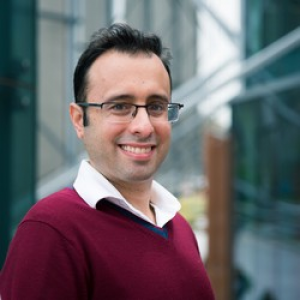Meet the Speaker – Anastasios Panagiotelis

Associate Professor Anastasios Panagiotelis
The University of Sydney
We talk to Associate Professor Anastasios Panagiotelis from The University of Sydney Business School about what drives his interest in the field, reducing the impact of climate change and what he hopes attendees will take away from AMSI Winter School.
1. How do you explain your work and its real-world impact to people outside of the mathematical sciences (think friendly chat at a BBQ)?
Working in statistics and data science this is actually much easier to do compared to 10 or 15 years ago. Algorithms are so ubiquitous that most people are aware that it is a computer program that recommends a movie to them, determines how much they can borrow, or tells their supermarket when it is time to order stock. I simply explain that all those computer programs are underpinned on mathematical ideas and it is the development of those ideas that I contribute to, at least in some small way.
2. What drives your interest in this field?
The ability to keep one foot in real world problems and another foot in more high-level mathematical abstraction. When you work on different practical problems it is astonishing how often you end up needing to learn (or re-learn) some mathematics that you never anticipated you would require. Although I am a statistician, the course that I am going to teach is based on research that required me to learn more about geometry. The beauty of maths is the sheer interconnectedness of it.
3. What are the next interesting “big questions” or challenges you hope to tackle?
Perhaps the biggest challenge we face is reducing the impact of climate change and one of the things we need to do to meet this challenge is produce electricity from sources other than fossil fuels. I think the next decade is going to see even more penetration of solar electricity and batteries which in turn will see our electricity grid become more decentralised. We don’t have to choose between reliable power and clean power, if we are smarter in operating a more decentralised grid. By being smarter here, I mean developing methods that forecast demand at a household level rather than an aggregate level and on a scale of millions of households. This is small part of a “big” question but every little contribution counts.
4. Best piece of advice you’ve received?
Do not stress about things you cannot control since there are enough things that you can control that are worth stressing about!
5. Deepening field knowledge and providing a networking platform, why are opportunities such as AMSI Winter School so valuable? What do you hope attendees take from your lectures?
Well in the short run I hope they enjoy the lectures! In the long run I think opportunities like AMSI Winter School are all about building a community of people interested in mathematics. The participants could end up in very different fields but hopefully the contacts they make through AMSI will serve them well for the rest of their lives.
6. If you could be anywhere right now, where would you be?
With a glass of wine on the same beach of the same Greek island where Pythagoras kicked back and worked out how to prove the Pythagorean Theorem.
Associate Professor Anastasios Panagiotelis will be presenting the topic Dimension Reduction: A plane and simple primer on linear and nonlinear algorithms with applications at the 2021 Winter School at Queensland University of Technology from 12-23 July

